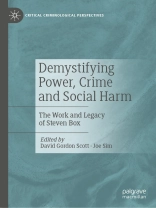This collection revisits Steven Box’s book, Power, Crime and Mystification, published in 1983, and considers its relevance forty years on. It introduces the critical analysis developed by Box which examined corporate crime, police crime, rape and sexual assault and female crime and analyses the continuities and discontinuities since 1983 in relation to crime, the state and the exercise/mystification of power. The book explores the ways in which we can see his influence nationally and internationally on critical criminological, zemiological and abolitionist writings today. It asks how can these perspectives be applied to a critical analysis of contemporary, state authoritarianism and the criminal injustice that this authoritarianism generates? Additionally, how can Box’s concepts shine a critical light on contemporary social harms that were not covered in the original book? The collection provides a toolkit for students and academics to criticallyanalyse the issues around crime/social harm, power/powerlessness, truth/mystification, criminal injustice/social justice as well as historical and contemporary sites of resistance confronting the exercise of state power.
Cuprins
Introduction.- chapter 1: steven box: a ‘realist of a larger reality’(david scott and joe sim).- part 1: corporate crime.- chapter 2: corporate crime, regulation and the stat (steve tombs).- chapter 3. From corporate corruption to rentiership: extending box’s power, crime and mystification (steven bittle and jon frauley).- chapter 4. Power, crime and deadly deception (david whyte).- chapter 5. Climate change, planetary collapse and the ‘mystification’ of environmental crime (reece walters).- chapter 6. Fighting for ‘justice for all’ in an era of deepening exploitation and ecological crisis (elizabeth bradshaw and paul leighton).- part 2: power, state crime and social harm.- chapter 7. The neoliberal state: then and now (samantha fletcher and will mcgowan).- chapter 8. The austerity state, ‘social junk’ and the mystification of violence (chris grover).- chapter 9. Steven box and police crime: understanding and challenging police violence and corruption (will jackson).- chapter 10. ‘the first narrative that is put out’: the mystification of police institutional violence (Lisa white and patrick williams).- chapter 11. Immigration control, mystification and the carceral continuum (jon burnett).- chapter 12. Criminal law categories as ideological constructs: the case of human trafficking (shahrzad fouladvand and tony ward).- part 3: power, gender and sexual violence.- chapter 13. Power, sexual violence and mystification (kym atkinson and helen monk).- chapter 14. ‘rape kills the soul’: the use of sexual violence by state and non-state actors in war and conflict (brenda fitzpatrick).- chapter 15. Gender, powerlessness and criminalisation (kathryn chadwick and becky clarke).- chapter 16. Mystification, violence and women’s homelessness (vickie cooper and dan mcculloch).- part 4: demystifying social harm.- chapter 17. Standing on the shoulders of a criminological giant: steven box and the question of counter-colonial criminology (biko agozino).- chapter 18.The policing of youthful ‘social dynamite’ within neo-liberal capitalism: continuities, discontinuities and alternatives (jodie hodgson).- chapter 19. Demystifying injustice: joint enterprise law and miscarriages of justice (janet cunliffe and gloria morrison).- chapter 20: punishment in ‘this hard land’: conceptualising the prison in power, crime and mystification (joe sim).- chapter 21. Demystifying murder: open university pedagogy, social murder, and the legacy of steven box (deborah h. Drake and david scott)
Despre autor
David Gordon Scott works at The Open University, UK. His previous books include Why Prison? (Cambridge University Press), Against Imprisonment (Waterside Press), For Abolition (Waterside Press) and The Routledge International Handbook of Penal Abolition (Routledge, co-edited with Michael Coyle). David is co-founding editor (with Emma Bell) of the international journal Justice, Power and Resistance. A former coordinator of the European Group for the Study of Deviance and Social Control (2009-2012), he is Chair of the Weavers’ Uprising Bicentennial Committee.
Joe Sim is Emeritus Professor of Criminology at Liverpool John Moores University, UK. His previous books include Medical Power in Prisons (Open University Press), Punishment and Prisons (Sage), British Prisons (Basil Blackwell, with Mike Fitzgerald) and Prisons Under Protest (Open University Press, with Phil Scraton and Paula Skidmore). He has also co-edited Western European Penal Systems (Sage, with Vincenzo Ruggiero and Mick Ryan) and State Power Crime (Sage, with Roy Coleman, Steve Tombs and David Whyte). He is a Trustee of the charity INQUEST.












